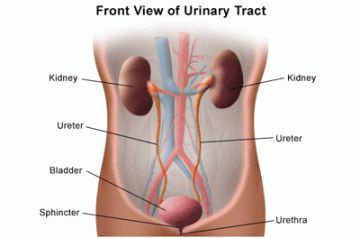Urethral Cancer
Find your care
We deliver customized urology care based on your unique needs. To learn more or connect with a urology specialist, call 310-794-7700.
What is Urethral Cancer?
Overview. Urethral cancer, in which malignant cells form in the narrow canal that carries urine from the bladder outside the body (as well as semen for men), is one of the rarest forms of cancer and is often associated with invasive bladder cancer. It tends to spread rapidly to surrounding tissues (the vagina and bladder for women; the penile area, prostate, and regional lymph nodes for men), and is often advanced at the time of diagnosis.

Types. The urethra is located just above the vagina in women and within the penis for men. Several types of cells within the urethra can become malignant. The most common urethral cancer is known as squamous cell carcinoma, involving the flat surface cells near the bladder in women and within the penis in men. Other forms include transitional cell carcinoma (developing in the urethral opening in women and in the portion of the urethra within the prostate in men), adenocarcinoma (developing in the glands near the urethra) and, less commonly, melanoma and sarcoma. Urethral cancers located closer to the urethral opening tend to be more successfully treated than those that develop closer to the bladder, which are usually more invasive.
Risk Factors. Although rare for both sexes, urethral cancer occurs more in women than in men. Risk factors include age (it is most common in people 60 and older) and a history of bladder cancer. Conditions that produce chronic inflammation in the urethra, including frequent urinary tract infections and certain sexually transmitted diseases such as human papillomavirus (HPV), are also associated with a higher risk.
Symptoms and Diagnosis. Urethral cancer often does not produce noticeable symptoms at first. The first signs may include bleeding from the urethra or blood in the urine; frequent urination or a weak, interrupted urine flow; discharge from the urethra; or lumps or growths near the urethra. However, these can also be signs of other, non-malignant conditions. A number of tests are used to determine the cause, and ultimately a biopsy is needed to make a cancer diagnosis. If cancer is confirmed, imaging tests are used to determine the extent to which the cancer cells have spread. This process, known as staging, helps to guide the treatment.
Treatment. Surgery is usually the primary treatment method, with chemotherapy and radiation also used, either alone or in conjunction with the surgery. Depending on the location of the cancer, surgery may be needed to remove the bladder and urethra; bladder and prostate; bladder, urethra and vagina; and part or all of the penis and penile root, as well as any cancerous lymph nodes. The reproductive organs are reconstructed in an additional surgical procedure, and a urinary diversion can be created in cases in which the bladder and urethra are removed.